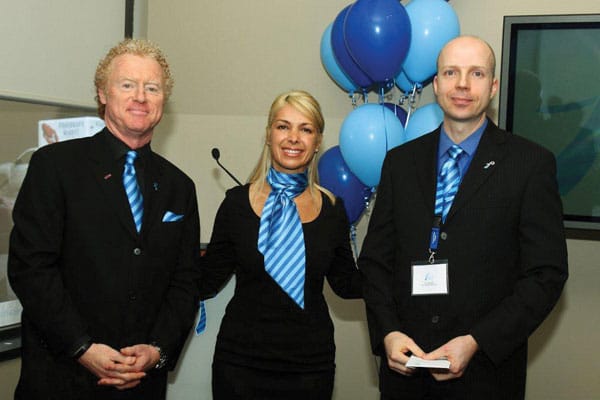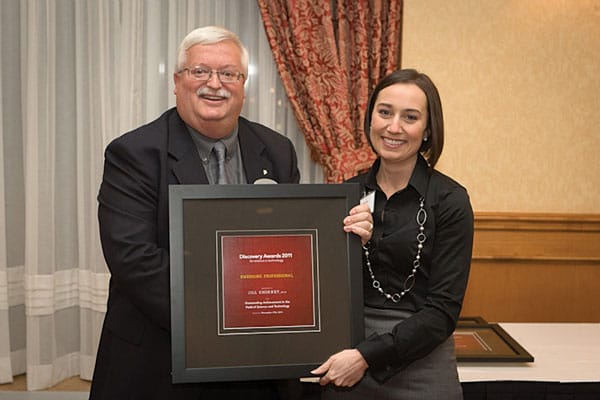Prostate cancer patients at the QEII Health Sciences Centre in Halifax will soon benefit from a dedicated MRI, thanks to a recent gift from Prostate Cancer Canada to the QEII Foundation. The $60,000 gift included the software necessary to perform endorectal MRIs, a technique that involves inserting a coil into the rectum to obtain dedicated high-resolution images of the prostate. Endorectal MRI is a common tool for prostate cancer monitoring in Canada; it is much more successful in detecting and evaluating cancer than other MRI techniques, which involve body coils that are placed externally on the patient.
New MRI Ccan for Prostate Cancer
by Sarah Metherall

This is the first endorectal MRI at the QEII. It is anticipated that about 100 patients will receive this exam annually. The MRI will be used to determine the stage of a patient's cancer, and to monitor patients.
Capital Health sees approximately 295 newly diagnosed prostate patients a year, the majority of which are treated at the QEII.
Expanding Epilepsy Monitoring
by Tanya MacLean
Thanks to a generous gift of $100,000 from Canadian pharmaceutical company UCB Canada, the epilepsy program at the QEII Health Sciences Centre in Halifax is one step closer to expanding its epilepsy monitoring unit from two to four beds.
The need for an expanded unit is backed by the data - at least 16,000 people are living with epilepsy in Atlantic Canada; approximately 16 per cent of those individuals are potential candidates for surgery. The epilepsy monitoring unit (EMU) is the only dedicated adult unit that accepts referrals from all of the Atlantic provinces.
"We are only able to study 40 to 42 patients per year, given the limited number of beds and the lengthy admission of one to three weeks per patient," explains Dr. Mark Sadler, co-director of the epilepsy program at the QEII.
"The lengthy admission is required to record a sufficient number of clinical events to allow for precise diagnosis."
UCB Canada's $100,000 gift marks the beginning of a promising long-term relationship. "We are on the threshold of a really big opportunity, thanks to the generous gift from UCB Canada," says Dr. Sadler.
Studying Mobility and Balance in Older Adults
by Jocelyn Adams
Taking note of mobility and balance in adults 65 years of age and older when they are admitted to hospital can help physicians understand which patients have a higher risk of dying, according to a new study funded by the QEII Foundation and the Dalhousie Medical Research Foundation in Halifax.
"Our study suggests that older people whose mobility and balance deteriorated in the first 48 hours after admission had a much greater risk of dying within 30 days, in comparison to people whose mobility and balance stayed the same or improved," says study author Kenneth Rockwood, staff internist and geriatrician at the QEII and professor of Geriatric Medicine at Dalhousie University.
The study included 409 people, 65 years of age and older, who were admitted to the Halifax Infirmary at the QEII Health Sciences Centre. Findings revealed that 71 per cent of patients whose mobility and balance worsened within 48 hours of admission died within 30 days. In contrast, only four per cent of those whose mobility and balance remained stable or improved died within the same time frame.
Dr. Rockwood and his team hope the study's results will be used to increase observation and tracking in older adults admitted to hospital. "Our results confirm what good clinicians know, but that often is not followed systematically in hospitals, which often focus more on laboratory tests or x-rays," says Dr. Rockwood.
Improving Wound Care
by Carol Moreira
Nurse-turned-entrepreneur Corrine McIsaac tells a sad story to illustrate how much poor wound care costs individuals and health care systems.
The president and CEO of Health Outcomes Worldwide, based in New Waterford, NS, says she met a 100-year-old woman who had suffered for 45 years with venous leg ulcers. This type of ulcer is wet and weepy. Over the decades, embarrassment had forced the woman to miss many social events.
McIsaac was upset to realize that this woman, like many patients, had been receiving the wrong kind of treatment - gauze dressings. When she received the correct treatment - compression stockings - her wound healed in eight weeks.
"But she told me it was 45 years too late," McIsaac says. "The distressing thing is that 45 years ago, this treatment was available."
McIsaac is on a mission to improve wound care. She claims that poor wound care across the country causes enormous suffering and wastes resources.
The problem, according to McIsaac, is that health care professionals sometimes receive inadequate training in wound care. Her company helps organizations measure their wound care practices against best practices, and make changes to improve patient care and decrease costs.
She says that over a decade ago, her company, working with Nova Scotia's Department of Health, saved the provincial health system $3 million in one year. Health Outcomes Worldwide currently has a proposal before the Nova Scotia government that McIsaac claims will save $7 million within 12 months, and improve wound care for patients in home care, long-term care and acute care.
"Our main aim is to improve patient care," McIsaac says. "But governments must recognize there is a direct correlation between the cost of care and the way care is delivered."
Measuring Breast Density
by Carol Moreira
A measuring system being developed in Halifax will help medical professionals refine their ability to assess a major risk factor for breast cancer - breast density.
Dense breasts have proportionally less fatty tissue than others, and women with very dense breasts can be six times more likely to develop cancer than women with fatty breasts.
Currently, when a radiologist reads a screening mammogram, he or she visually assesses the density of that woman's breasts and places her into one of four loose categories. Low-density breasts have a density of less than 25 per cent. The other ranges are from 25 to 50 per cent, 51 to 75 per cent and over 75 per cent.
An automated breast density management system, called Densitas, will evaluate digital mammographic images as they are taken and assess density down to the nearest percentage point.
"Densitas produces quantitative assessments of breast density, fits seamlessly into the clinical workflow and generates reliable real-time outputs," says system developer, Mohamed Abdolell, an associate professor with Dalhousie's diagnostic radiology department.
Abdolell says it is vital to improve breast cancer risk assessment and detection. In Canada, one in nine women is expected to develop breast cancer in her lifetime, and one in 29 is expected to die from it.
Diagnosing Concussion on the Spot
by Carol Moreira
When NHL hockey player Sidney Crosby suffered a series of blows to the head and a concussion that forced him to sit out most of the past hockey season, it boosted an important awareness of traumatic brain injury.
Millions of people suffer traumatic brain injuries every year. Typically, such injuries are difficult and time-consuming to diagnose, but the makers of a new portable detection device aim to make diagnosis easier and faster.
The Halifax Consciousness Scanner monitors the electrical activity of the brain to measure five indicators of neural processing - sensation, perception, attention, memory and language. This indicates a patient's level of conscious awareness, which will help determine whether he or she has suffered a brain injury such as a concussion from a fall or hit to the head. It takes just five minutes to perform a scan, which can be done at the location where it may be immediately needed: courtside, rinkside or on the sportsfield. The scanner summarizes the result of its tests in a simple number, so no expertise is needed to conduct or interpret the test.
It's important that individuals are diagnosed in a timely and accurate fashion: if patients suffer a second injury before the first has healed, they're at risk of developing long-term neurologic and functional deficits. Current diagnosis often relies on asking the patient to perform a simple task such as blinking. Test results can be faked by patients (an athlete, for example, who is eager to return to the game) or misinterpreted by professionals.
"Brain imaging methods take direct measures of the brain activity involved in consciousness," says Victoria Smith, business development officer at Mindful Scientific, in Halifax.
The devices will be relatively small, combining a specially designed headset with a portable hardware box. Smith says the scanners are currently undergoing clinical trials; it's hoped the devices will be available sometime next year, and that concerned parents of athletes might be inclined to purchase them.
To learn more about concussions and to read one family's story, see "Kids and Concussions".
Pediatric Care Close to Home
by Laura Fougere
A new pediatric clinic has opened in the Spryfield area of Halifax. The IWK Spryfield Pediatric Clinic is part of a two-year pilot project sponsored by the departments of Pediatrics and Primary Health at the IWK Health Centre. The goal is to build stronger connections between the IWK, the Spryfield community and community partners in the creation and delivery of children's health programs.
"The addition of a pediatrician in this community provides a unique opportunity to work side by side with family physicians and the many community groups and organizations that want to optimize children's health in Spryfield," says Dr. Heather Rose, head of the IWK's Division of Community Pediatrics.
The clinic, which is located at the Community Wellness Centre, provides pediatric consultation services for a variety of health care issues such as complicated asthma, failure to thrive and development or learning problems, and offers follow-up care for kids with complex health care issues in collaboration with the child's family physician and/or pediatric specialist.
"We want to recognize, support and utilize children's health resources that already exist in the community and advocate for those that are still needed," says Dr. Rose. "We also want to offer an opportunity for residents and medical students to learn pediatrics in a community setting."
The IWK Spryfield Pediatric Clinic operates two days a week (Thursdays and Fridays). Referrals for children who live - or who have a family physician - in the area will be accepted.
Emerging Professional
by Melanie MacKay

Dr. Jill Chorney, assistant professor of anesthesia at Dalhousie University, and a clinical psychologist with the Complex Pain Team at the IWK Health Centre in Halifax, has received an Emerging Professional Award from the Discovery Centre, in Halifax.
The award, which was presented last November, recognizes the outstanding achievements of a young professional in the fields of science and technology in Nova Scotia. Dr. Chorney's research and clinical practice in pain management - advancing the hospital and at-home care of children with chronic pain - earned her this prestigious award.
Dr. Chorney also recently received a Leaders Opportunity Fund award, which provides funding for research infrastructure from the Canada Foundation for Innovation. These funds will provide her with the opportunity to expand the infrastructure in her Child Health and Perioperative Care Laboratory at the IWK Health Centre.
To learn more about Dr. Chorney and her work, please visit pediatric-pain.ca.
Improving Access to Mental Health Care
by Melanie MacKay
The Mental Health and Addictions (MHA) program at the IWK Health Centre in Halifax is making access to care a priority. To that end, the IWK's MHA team is implementing a clinical system called Choice and Partnership Approach (CAPA) to provide faster and more efficient services to patients and their families.
Last November, Drs. Ann York and Steve Kingsbury - psychiatrists from the United Kingdom - visited the IWK to provide the Health Centre's MHA team with CAPA training. The CAPA philosophy, which is centred around the active involvement of children, youth and their families, says that having a better understanding of the demand for mental health services will allow health care providers to better match their clinical care capacity to that demand. The goal is to ultimately "do the right things with the right people at the right time."
The IWK's MHA program is currently working toward meeting with clients who have been awaiting services for up to 18 months. When families first meet with a clinician from the MHA outpatients team, they will participate in a "choice" appointment, which will give them an opportunity to discuss the problem that is concerning the family, and to develop a plan for the next steps.
When the system is fully implemented this April, it is expected that the wait to see a clinician will be reduced to four weeks.
The CAPA system has been used in the UK, New Zealand, and Australia to help eliminate wait-lists and to create a system of care that is responsive to the needs of families. For more information on CAPA, please visit capa.co.uk.
For more information about Mental Health and Addictions services at the IWK Health Centre, please visit iwk.nshealth.ca and click on "Care Services."
